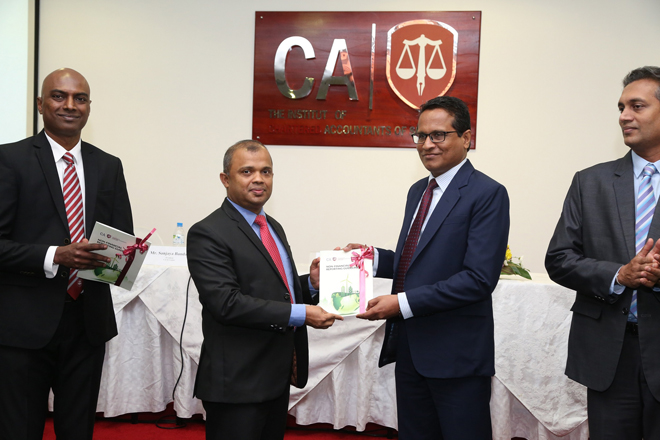In its standing as the sole authority to promulgate accounting and auditing standards in the country, the Institute of Chartered Accountants of Sri Lanka (CA Sri Lanka) on Wednesday launched the Non-Financial Reporting Guideline to strengthen and ensure fair and balanced corporate reporting among companies, while also promoting non-financial reporting practices amidst growing demands from diverse stakeholders for enhanced corporate social responsibility.
The Non-Financial Reporting (NFR) Guideline was launched in the presence of Viraj Dayaratne, Chairman of the Securities and Exchange Commission, Sanjaya Bandara, President of CA Sri Lanka, Heshana Kuruppu, Vice President of CA Sri Lanka, Nuwan Withanage, Chairman of the Task Force to Develop Non-Financial Reporting Practices in Sri Lanka and Dulani Fernando, Chief Executive Officer of CA Sri Lanka.
This NFR Guideline has been developed for all entities, including listed and unlisted, as well as large to small and medium-sized enterprises in Sri Lanka, which produce annual reports and follow the EESG framework concept, which stands for Economic, Environmental, Social and Governance, instead of limiting it to the ESG (Environmental, Social, and Governance) framework.
This framework has also introduced several novel concepts such as the “Core and More Approach” to simplify non-financial reporting practices. Further, to improve the comparability of non-financial information the framework included the “KPI based approach” for both quantitative as well as qualitative. However, having understood that reporting is a journey, CA Sri Lanka further simplified the KPIs to basic level KPIs as well as advance level KPIs so that it is easier for local companies to adopt.
A key benefit of this newly developed guideline which is in line with the international frameworks for non-financial reporting, is that it provides balanced and flexible guidance on reporting non-financial information in a way that helps companies to disclose material information consistently and coherently whilst establishing a common language for non-financial reporting. The framework also ensures comparability across companies and sectors.
Sanjaya Bandara said that the aim of this guideline is to help companies show high quality, relevant, useful, consistent, and comparable non-financial information spanning economic, environmental, social, and governance-related matters, to ensure sustainable growth while providing transparency and accountability to all stakeholders of corporates that produce annual reports.
"In recent years, CA Sri Lanka has been paying special focus on why corporates must embrace ESG, while encouraging them to be more socially and environmentally responsible. Particularly in a complex global economy, organisations must understand the increasing need to adapt to changing expectations from multiple stakeholders who demand accountability and transparency both in a financial and non-financial sense. As such, I hope corporates will find this guideline important in comprehending and promoting non-financial reporting practices,” Bandara said.
Nuwan Withanage highlighted that the NFR Guideline has been developed with the aim of delivering investor-oriented sustainability-related disclosure focused on enterprise value creation that may create enterprise value over the short, medium, and long term.
"There is a widespread recognition that non-financial information has an essential role to play in providing a broader perspective on business performance alongside financial information. The demands from investors for non-financial information have increased since key decisions of investors are derived mostly through non-financial information. Therefore, appropriate non-financial disclosure is an essential element to enable investor confidence and in attracting potential investors," he noted.
According to Withanage, the guideline will benefit companies to look beyond current year earnings and provide a broader picture of shareholder value creation in their annual reports. The business-centric focus of the guidance is an opportunity for companies to focus their reports on those factors that are most important to the long-term prospects of their business. He said that greater transparency is also expected to make companies more resilient and perform better, both in financial and non-financial terms.
"Over time, this framework will lead to more robust growth in investments and employment and increased trust among investors," Withanage added.

